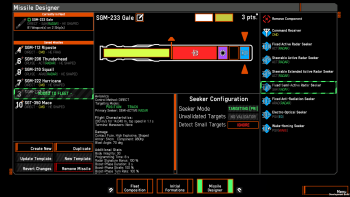Missiles
Missiles are the most powerful weapons a ship can carry but they have limited ammunition, can be shot down and fire slower than other weapons. The number of missiles that can be prepared to fire at the same time depends on the ship's maximum salvo size.
Missile designer
Missiles can be designed and colored in the fleet editor.
Selecting a missile's engine will bring the engine configuration triangle, allowing the engine to be focused on Top Speed, Maneuverability or Turn Rate.
| Missile Body | Size | Integrity | Socket Weight | Programming Time (s) | Components | Main Speed (m/s) | Thruster Speed (m/s) | Range (m) | Acceleration (G) | Top Speed (s) | Turn Rate (G) |
|---|---|---|---|---|---|---|---|---|---|---|---|
| SGM-100 Balestra Missile | 1 | 10 | 0.33x | 6 | 3 | 250-400 | 40-50 | 1458-5911 | 35.7-76.5 | 0.3-1.1 | 3.9-13.3 |
| SGM-200 Tempest Missile | 2 | 30 | 1x | 8 | 4 | 150-350 | 30-40 | 2962-14920 | 14.3-30.6 | 0.5-2.5 | 1.5-5.3 |
| SGM-300 Pilum Torpedo | 3 | 110 | 3x | 6 | 4 | 125-200 | 20-35 | 2573-14797 | 10.2-15.3 | 0.8-2.0 | 0.8-3.6 |
| SGM-H-200 Cyclone Hybrid Missile | 2 | 25 | 0.8x | 10 | 4 | 150-350 Cruise 500-1000 Sprint |
30-40 Cruise 500-1000 Sprint |
5930-19359 Cruise 1438-4875 Sprint |
8.2-16.3 Cruise 120.0-204.1 Sprint |
0.9-4.4 Cruise 0.3-1.0 Sprint |
0.7-2.8 Cruise 14.8-31.9 Sprint |
| SGM-H-300 Atlatl Hybrid Missile | 3 | 60 | 1.8x | 16 | 5 | 100-200 Cruise 550-1000 Sprint |
20-40 Cruise 550-1000 Sprint |
7944-24917 Cruise 2216-7361 Sprint |
6.1-9.2 Cruise 76.5-127.6 Sprint |
1.1-3-3 Cruise 0.4-1.3 Sprint |
0.5-2.5 Cruise 16.9-40.8 Sprint |
Payload
The payload determines the damage done by a missile.
Avionics Package
The avionics package determines how the missile is controlled. It has the following configuration options:
- Weapon Role sets how the missile may be launched:
- DEFENSIVE: Missiles can be launched manually and by the point defense system.
- OFFENSIVE: Missiles can be launched manually.
- Launch Type sets the behavior immediately after launching:
- HOT: The missile's engine will ignite immediately, good for getting the missile moving quickly when fired in range of enemy point defenses.
- COLD: The missile will maneuver around the launching ship with thrusters until it has an unobstructed line to the target or first waypoint before igniting the main engines.
- Target Lost Behavior sets what the missile will do if it loses the target:
- RESUME SEARCH: The missile will search for a new target.
- SELF DESTRUCT: The missile will self destruct.
- Terminal Maneuvers sets what evasive maneuvers the missile will perform on its terminal approach to the target:
- NONE: No evasive maneuvers.
- WEAVE: Missile will weave from side to side.
- CORKSCREW: Missile will spiral towards the target.
- Trajectory Preference sets the approach angle the guidance system will try to maintain.
- FREE APPRAOCH: Missile will fly directly towards the target.
- MINIMUM ANGLE: Missile will try to avoid getting between the launch ship and the target.
Seeker
The seeker determines the method the missile uses to track its target. Most seekers can choose whether to ignore small targets such as other missiles or not. If a missile has two seekers the secondary one (the one not placed at the nose of the missile) can be set to a Seeker Mode:
- TARGETING: Secondary seeker will be used to acquire a target if the primary seeker does not find any.
- VALIDATION: Secondary seeker will be used to validate targets. Missile will favor targets validated by both seekers, greatly reducing the effectiveness of enemy decoys.
Auxiliary
Auxiliary components can be used to grant a bonus to the missile. They can only be used on missiles that include at least 4 components.
| Auxiliary | Modifiers | Base Cost (pst) |
|---|---|---|
| Cold Gas Bottle | +150% Boost-Phase Strafe +100% Boost-Phase Turn Rate |
1 |
| Decoy Launcher | +3 Decoys Fired | 12 |
| Cluster Decoy Launcher | +6 Decoys Fired | 30 |
| Fast Startup Module | -66% Programming Time _20% Failure Rate |
3 |
| Hardened Skin | +20 Body Integrity | 5 |
| Radar Absorbent Coating | -40% Radar Signature Bonus | 4 |
| Self-Screening Jammer | RADAR - range: 1000 m; radiated power: 0.5 kW; gain: 2 dB | 5 |
| Boosted Self-Screening Jammer | RADAR - range: 4000 m; radiated power: 0.5 kW; gain: 4 dB; beam width: 10 deg | 10 |
 Hooded Horse Wikis
Hooded Horse Wikis
